
Kelli O'Hara
Kelli O'Hara, a four-time Tony nominee for her work in The Light in the Piazza, The Pajama Game, South Pacific and Nice Work If You Can Get It, is once again back on Broadway, sharing her glorious soprano and unique talents in the new musical The Bridges of Madison County, based on the Robert James Waller novel (and the subsequent Meryl Streep-Clint Eastwood film) of the same name. Truth be told, this writer was unfamiliar with either previous version of the property, yet I was completely swept away by the ill-fated love story that is at the center of this emotionally fulfilling evening at the Gerald Schoenfeld Theatre. The production, one of the best musicals of the current season, boasts a gorgeous score by Tony winner Jason Robert Brown and a compelling book by Pulitzer Prize winner Marsha Norman, but it is the performances of O'Hara and co-star Steven Pasquale — in his long-awaited Broadway musical debut — that send this show soaring. O'Hara is in particularly fine form, offering what may be her best performance to date: She is funny, touching and intriguing, and her limitless voice is as colorful and beautifully shaded as ever. She is also well-matched by the ruggedly handsome Pasquale; in fact, their onstage chemistry is palpable. I recently had the pleasure of catching up with the mom of two, who spoke about her latest Broadway outing, her third directed by Tony winner Bartlett Sher; that interview follows.
Question: When and how did you originally get involved with The Bridges of Madison County?
Kelli O'Hara: I think it will be four years. Jason [Robert Brown] called me, and he said that he and Marsha Norman were working [together] and had an idea for a project … and he wanted to write music for me the way that I wanted to sing, which is pretty amazing. [Laughs.] Steven [Pasquale] said one time in an interview that it could have been called Poop: The Musical, and he would have done it just based on who was involved. [Laughs.]
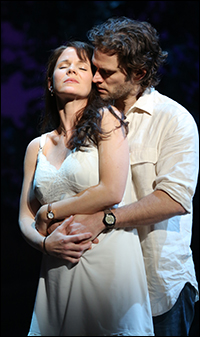 |
||
| O'Hara and Steven Pasquale in The Bridges of Madison County. |
||
| photo by Joan Marcus |
Kelli O’Hara: I don’t think I’ve ever seen the film, although now I’ve watched some clips because I would be stupid not to understand what the master did. [Laughs.] I saw some YouTube clips, and I read the book when I was a teenager. I remember being blissfully … well, it was very sordid. I was sitting there as a preteen probably going, "Oh my gosh, what is this?" [Laughs.] But I hadn’t really revisited it. … Steve and I recorded some of it as a publicity thing for an audiotape, and reading it then made me blush. It was kind of interesting to read it as an adult, but as a kid I thought, "Woooo this is great. I want to keep reading."
Question: How much has the show changed over the years? Explain what the process is like.
Kelli O’Hara: It’s been pretty amazing. The first reading we did was only one act, as is pretty normal. But the music was very much in that feel of that kind of rustic country music, what Steve sings, which is just so beautiful. I remember looking at Jason and saying… [that] Francesca needs a voice. So we went from that type of [music] and one half of a [show], until the very next reading came all of this [other music] — like the opening number, which, to me, is one of my favorite things I’ve ever gotten to sing. He just showed up with it. So, between the first reading and the second reading, the genres of music were completely added to and enhanced. We had so many other songs that have been cut, we have songs that have been added, and we’ve had characters that have been added. The first reading or so there was no sister, Chiara. I often say to people, "In plays and musicals we have a lot of backstories that we know of, that we try to have layers of inside of ourselves when we’re performing, but in this production, we’ve brought them onstage with us." I feel like over the time of the past four years, we have been adding our backstories. Marsha was adding that backstory into our book, and Jason was writing music to support that. You have the neighbors and you have the people that are watching, the watchful eyes, and I just feel like it’s a process of growth. But, also, you can start off with an entire thing, and have it completely cut to pieces and rethought. But I think they knew the direction they were going from the very beginning. It seemed very smooth.
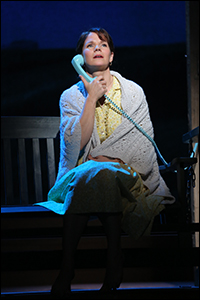 |
||
| Kelli O'Hara |
||
| Photo by Joan Marcus |
Kelli O’Hara: It's funny that you ask. A lot of people will say [to me after a show], “Oh, did you see the guy in the third row?” And, I’m one of those [actors] who never notices that. I somehow get completely self-involved. No, I’m kidding! [Laughs.] But I’m kind of into [the role], and I try to just be in the story. And, so for a long time, appropriately so, I didn’t have [the onstage actors] as part of my periphery, but, lately, as we’re kind of warming up in the show, I’m really starting to be amazed and actually in wonder, noticing where they are and what they notice and using that a little bit more. It’s actually a lot of fun, and the people that are in the show, the actors, are so invested and so great, and it’s actually kind of fun to see what they’re doing in reaction to what I’m doing.
Question: This is your third musical with Bart Sher. How does having those other experiences affect working with him?
Kelli O’Hara: He’s amazing. I have so much respect for Bart. He’s really become a great mentor of mine; he’s a great teacher. I love where I got a degree, but a lot of my education has come from working with him. And each time, we don’t have to start over; it’s like getting a masters on top of an undergraduate and then a doctorate. You don’t have to go back and start from scratch; you’re taking what you already learned and starting there and building on that. So when I walked in the room this time, I just knew that we were going to get right to work, and I felt like I was kind of my freest self, to argue with him, whatever it is we were going to do…I just sort of hash things out, and he listens and I listen; then, sometimes, we fight and don’t agree and end up always coming to the same thought. That’s pretty healthy, and it’s pretty amazing to have when it’s as nerve-wracking as opening a new show can be.
Question: How would you describe Francesca, and has your idea about her changed throughout the process?
Kelli O’Hara: I would describe Francesca as someone very unlike myself. Her European sensibilities and her past, what she came from, trying to escape a war-torn city with no options for her future, is something I really didn’t have to deal with in my life. So I would consider her as someone who is very intriguing to me, and also I’m very sympathetic to a lot of the things that she’s had to go through in her life. I feel like what I’ve grown to know about her is that she’s probably as strong as you’d want a woman to be, but also as vulnerable and scared as humans can be.… A lot of people might not make the decision she made simply because they’re stronger or smarter and they know the outcome of it. But I think she fell into something very quickly, which is hopefully not a choice that I would make for myself. But then she is able to step up and make the right one for her family, for her kids. So I think I’ve learned to respect her, but I think going in, I really worried about how she would be perceived and would she be a sympathetic character. Marsha listened to my concerns about, “Do I invite him in for tea? Do I invite him in for dinner? Why am I pushing this [relationship]?” I was very concerned about that because I don’t think that would be something that people understand. But what I’ve learned to appreciate about her situation is the timing – where it was, when it was. I grew up on a farm, so I kind of know what her life was, but this was 1965, it was a male-dominated household, things like that that a lot of people today don’t understand that make her make the choices she made. So, I believe in her, and I want people to believe in her and for people to know that she’s a fallible character, but also one with great heart, not unlike Nellie [Forbush].
Question: We talked about your relationship with Bart Sher, but you also have recent history with Steven, having done Far From Heaven. Was that helpful in creating your relationship in this?
Kelli O’Hara: Not that, probably. …We’ve been friends for 15 years, so I think we’ve been waiting [for this kind of experience]. We did workshops and productions of Piazza together before he got his TV show and wasn’t able to do Broadway. So we go way back, and I think we’ve always wanted to work together in this way. But doing Far From Heaven and putting us in a room together, just working together, reintroduced us in a professional way together, which was great. But I think that we were just ready to work together.
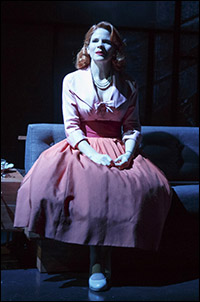 |
||
| O'Hara in Far From Heaven. |
||
| Photo by Joan Marcus |
Kelli O’Hara: I think one of the words that best describes [Steven] is he’s so consistent. He’s the strongest, healthiest — he doesn’t stand on ceremony about anything. He just comes in, does the work, it’s not a big deal, and he can do it every time. His voice is always there, and I feel like for a partner that is so important, to be able to depend on. I don’t have to worry about what I have to do to make sure he’s feeling good. I just think we feel that way about each other. We just come in and do our work.… A lot of people ask about the chemistry between you and you and you and you, this guy and that guy. I have had amazing leading men, but not just because people think they’re attractive or they’re sex symbols or whatever, but honestly, Matt Morrison, Harry [Connick Jr.], Paulo [Szot] never missed shows. I’m not saying we can’t miss shows for being sick. I’ve obviously done it, but when you work with someone like that, you know that they are dedicated to the work, and you don’t feel that you are putting in more than they are and therefore you feel sorry for yourself, and you start to hold that against them. Steve is another one… [and] if we’re both in it to win it, you can really trust each other.
Question: How difficult is it to play the emotional aspect of the musical eight shows a week — having to choose between the two lives and getting your mind there?
Kelli O’Hara: I will say it’s been a journey because when I first started rehearsing, I was right off being with my baby for the first three months, and I was very post-partum, and all the emotions were completely accessible to me. Tears were just falling. And, when you start to do it, it grows the same, and you have to use technique and you have to learn how to keep it up. My assistant director gave me the best advice ever. She said, “You have to stay in the present.” We’re starting to fall into what we know is coming next, where we’re going to get a laugh, or where we’re going to get a cry or whatever it is. You don’t really realize that you start to depend on the things that are consistent. But the only thing that is consistent is staying right in the middle of where you are onstage. Because if Steve does something different that day, and I’m not paying attention because I’m already waiting for the next thing, I’ll miss a reaction I could have to that that is new and fresh. So the point is that I have to look at it differently each day, and I do. Sometimes I’m balling and sometimes it’s more of an introspective feeling, and I’m hoping that they all work.
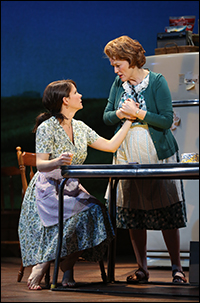 |
||
| O'Hara and Cass Morgan |
||
| photo by Joan Marcus |
Kelli O’Hara: That is very intentional from the creators, especially Marsha and Bart. Marsha is a very strong, independent woman, and she wanted this to be a story about female strength and power and making your own choices. And, Bart really wanted it to be in support of Americana. He loved the idea of making this country just as special as we think it is and we want it to be. Everyone has these ideas, especially about the middle of the country, about people being backwards and three-toothed. And, I think Bart is basically saying it’s funny when you ask for something what you might get back. Here's this woman that we… want you to think that’s she’s just this typical busybody, but you don’t realize that she’s one of the reasons why I can stay because I have somebody in my life like that. It's another reason why at the end of the play, everyone comes out to listen to me read the letter because they’re basically saying, “Maybe we don’t agree with it, but we’re in support of you. You have support, even though you were far way from your home.” And I think Marge, Cass Morgan, plays it so beautifully. People need people like that in their lives, and we don’t trust people enough. That’s one of the problems that Francesca had before she had this experience — she didn’t know who she could trust, so she didn’t open up to people. And now she’s probably, having had the affair, she has closer relationships at home more than she ever did before.
Question: Do you have a favorite moment for Francesca? Is there something you look forward to every night?
Kelli O’Hara: Every part has its relief when I’m done with it. [Laughs.] I love the first number, but it certainly doesn’t feel great going into it because it’s the first thing in the show. I’m always taking a few extra breaths! So I love the first number, I love my big number with Steve, but I think something I can consistently look forward to because it doesn’t have the pressure of, “Will we land this?” I was talking to him about this the other day. I love when we just sit and make dinner and Whitney Bashor is just singing her song. It’s the moment that they’re clicking and connecting. I’m from a big family of cooking, and meals mean a lot to me, and I just find that moment as being very realistic and fun.
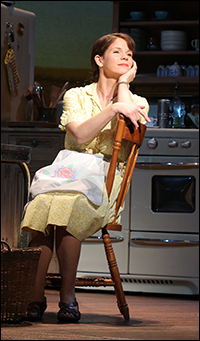 |
||
| Kelli O'Hara |
||
| Photo by Joan Marcus |
Kelli O’Hara: Right now I’m pouring myself a cup of coffee as we speak, and that is absolutely forbidden. I’m not supposed to have coffee, but I’m like, “You know, I better have a cup of coffee, I better do it.” [Laughs.] It seems like [this show] would be more taxing, but because it’s the way I feel best singing, that’s not really what has been taxing. Mostly I think that you can do your show because it becomes like muscle memory – but you have to keep yourself healthy. I can’t drink a lot and don’t smoke, and I try to exercise and I try to do some physical stuff, and I try to stay pretty healthy. But I think the main thing right now and one of the reasons why I’m vocally tired is that you need to get sleep, and since my baby was born, it’s just a little impossible.
Question: How has it been combining new motherhood with this show?
Kelli O’Hara: Well, I’m not going to say it’s been completely easy, but like I said before, it’s so rich right now. I feel so rich in my emotions and in my life and so grateful when I’m home and so grateful when I’m at work. It’s kind of a heightened version of everything, and I’m not going to curse that. I feel like it’s a very lucky place to be. My fatigue is sometimes hard, but I feel like it’s all worth it right now, and I’ll sleep later. It’s not easy, but it’s the most rewarding time I’ve ever had, and I’m not going to do anything but be grateful.
Question: This may be a silly question, but do you have any other projects in the works?
Kelli O’Hara: I have a couple of projects that I’m pretty excited about. I’m going to do my first Metropolitan Opera gig, which has kind of been my dream. For New Year's Eve next year, The Merry Widow, with Rene Fleming and Nathan Gunn and Susan Stroman. And then I’m in talks for doing The King and I.
Question: You’ve done less TV and film than some of your contemporaries. Has that been a conscious choice to focus on theatre — because you’ve done so much theatre? Is that what you enjoy most or where your path has taken you?
Kelli O’Hara: I know that theatre is definitely my love and my first priority — I mean, that’s easy. But I honestly think the difference between doing a lot more TV and film for me has been auditioning, and I stopped auditioning because I’m a mom. It’s a choice that I’ve made. When I’ve done TV and film, when it’s offered to me, I loved doing it, and I would do it again, but the ins and outs of auditioning is – that’s time away from my kids. If I’m already working at the theatre and I’m already working a job, I can’t really afford to have two jobs and have kids, and auditioning is a job. If I wasn’t doing a play or a musical, I would start auditioning again maybe. I’ve gotten things before and wasn’t able to fit them in my show contract, and things haven’t worked out and I kind of just toss it up and say it just wasn’t meant to be. I think that there could be some more of that in my future, but it would take me auditioning for it.
[For tickets, phone (212) 239-6200 or visit Telecharge.com. The Schoenfeld Theatre is located at 236 West 45th Street. For more information visit BridgesOfMadisonCountyMusical.com.] *
Diva Talk runs every other week on Playbill.com. Senior editor Andrew Gans also pens the weekly columns Their Favorite Things and Stage Views.
PHOTO ARCHIVE: Four-Time Tony Nominee Kelli O'Hara on the Musical Stage







































